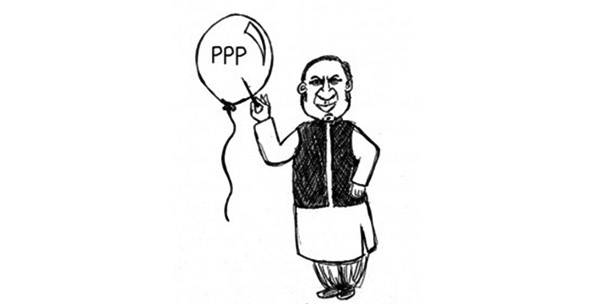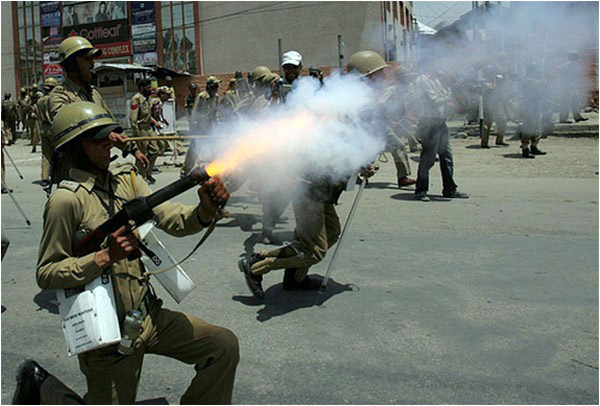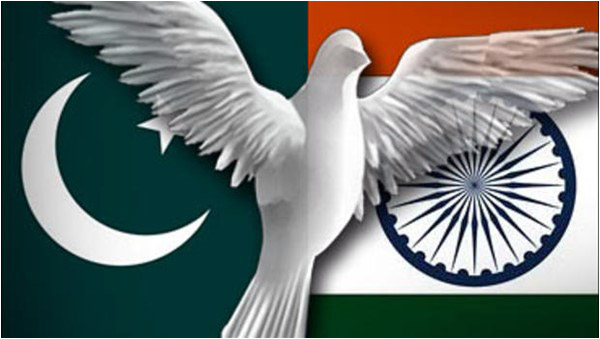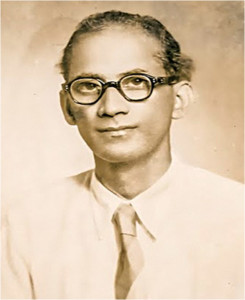
PPP in Punjab
Sir,
Nothing could be further from truth than PPP referring to large scale allegations of electoral rigging as reason for their wipeout from Punjab. Zulfikar Ali Bhutto won landslide not from Sindh but Punjab, because he won the hearts and minds of people, giving them hope amidst promises of reform and social justice. PTI benefited from PPP’s loss in Khyber Pakhtunkhwa and Punjab and it can gain in the next elections if it treads the path of constitutional struggle and wait for the fallout from PML-N’s incumbency and the poor governance style of the party, whose poor decision-making has left most loss making state-owned enterprises without a credible leader, and who is refusing to tax the rich.
Punjab has never voted on the basis of ethnicity. PPP’s poor performance in the polls in 2013 was because of its poor governance, corruption, worsening law and order, abject neglect of rise in terrorism and their perceived patronization of criminal mafia, land grabbers and black economy.
There was this endless saga of plunder in state-owned enterprises by semi-literate cronies of the PPP hierarchy and jobs being sold to burden the already over-staffed companies making huge losses. Not even Hajj and Umra pilgrims were spared by the greed of those at the helm.
The PML-N won more because of the backlash against PPP than its own manifesto. In addition to this, with all his faults, the Punjab government headed by Shahbaz Sharif, fared far better in comparison to other provincial governments. Billions were earmarked for development in Sindh, but there is nothing to show on ground. So people voted based on the choices they had, and the PPP suffered a humiliating defeat because it had failed miserably in the last five years.
Ahmad Mukhtar,
Lahore.

Major fail
Sir,
Obstinacy on the part of Indian External Affairs Minister Sushma Swaraj, demonstrated during her address to the United Nations General Assembly (UNGA) on September 26, 2016, has no parallel in recent times. It, in fact, broke all norms of sanity and diplomacy. Her blatant claim at the world forum that occupied Kashmir was an integral part of India is outright disrespect shown by her not only to the UN Resolution of 1948, on occupied Kashmir, but also to the prestige and honor of the world body.
Her claim vis-à-vis Indian-held Kashmir and her tirade vis-à-vis the issue of terrorism in occupied Kashmir, allegedly being undertaken by Pakistan, are nothing but a figment of her and her government’s wild imagination. While laying her government’s claim on occupied Kashmir, as an integral part of India, Sushma Swaraj forgot the fact that occupied Kashmir remains a disputed territory according to the UN Resolution of 1948 and has to be resolved through a plebiscite in the held territory. So far as the issue of terrorism is concerned, it is India that has long been a sponsor and practitioner of state terrorism against the innocent and unarmed Kashmiri people and not Pakistan; a glaring truth that is known to the entire world.
India should stop day-dreaming and start accepting the fact that Jammu and Kashmir is a disputed territory; it has never been and would never be an integral part of India. The war phobia that India has created and the fillip that the Indian media has given to it cannot cow down Pakistan and stop it from extending its moral and diplomatic support to the enduring, purely indigenous, freedom movement of the Kashmiri people. India must remember that her highhandedness in occupied Kashmir has made her stand completely exposed in the eyes of the world. This, in fact, is what is going to isolate India and not Pakistan in the international community.
India must appreciate that Kashmir is a long-outstanding issue and it must be resolved, through a plebiscite in the occupied territory, according to the UN Resolutions of 1948. Violence, India must realize, will only breed violence which will be detrimental not only for India and Pakistan but the entire region. Admonition of the US and the world powers that be, to India and Pakistan, to exercise restraint and seek to resolve matters through dialogue is well taken. But the world community must clearly understand that all pending issues between India and Pakistan can be resolved through diplomacy, accept the issue of Kashmir, which must be resolved in accordance with the UN Resolution of 1948. If the UN and the international community fail to quickly realize this fact, enduring peace between India and Pakistan will never be established and the entire region will remain in state of turmoil for decades to come. This obviously will not have a positive bearing on the affluent societies of the world too.
M Fazal Elahi,
Islamabad.
Phenomenon
Sir,
Reference the indigenous uprising by Kashmiri youths in Indian-occupied Kashmir and creation of Burhan Wani phenomenon, who has become an icon like Bhagat Singh. Mahatma Gandhi stated that “nonviolence is the first article of my faith. It is also the last article of my creed”. India under Modi has adopted use of violence by state and patronized Hindu extremists obsessed with Hindutva philosophy with likes of Shiv Sena, treating Indian Muslims as fourth class citizens who can be killed on mere suspicion of eating beef. Even loyal Indian born Muslims, whose forefathers lived there for centuries, are discriminated against to buy property in Bombay.
What can India expect other than an uprising with over 7 lakh regular and paramilitary troops stationed in Valley, involved in murder, rape, arson and kidnapping of Muslims? India needed a leader like Mahatma Gandhi, who could win hearts of Dalits, Muslims, Christians, Sikhs etc by wooing their youth and treating them as first class citizens, erasing this class distinction which threatens India from within. India faces seven insurgencies in North East which is thousands of miles from Pakistan. What else can India expect when they drive Kashmiris to desperation, using rape as a tool to dishonor and punish them?
Violence begets violence and armies are raised to fight enemies, not unleash reign of terror on those which a country claims to be its integral part. I don’t think even Hurriyat leadership have control over this present uprising by Kashmiri youth. Desperation and oppression beyond a certain point becomes the fuel which drives this engine, seeking liberation and freedom from occupation.
In over 200 years of British Raj, there has never been a sustained uprising inspite of bloodshed let loose by occupation army as is taking place in Kashmir. India would be fooling to thinks that Pakistani state and its military can manage and foment this scale of indigenous uprising in Occupied Kashmir, where youth armed with stones are facing largest army in subcontinent. Sometimes it is sane to accept that a people unwilling to be part of a country cannot be forced to become an integral part through use of force. Why not hold a free and fair plebiscite in Kashmir, because even Indian Constitution Article accepts its separate entity and status.
M Tariq,
Lahore.
Fragile peace
Sir,
Exchange of nationalism-laden vows and threats continue to destroy peace between India and Pakistan. Jingoistic Indian media is putting all its efforts to bring the two countries to war. Pakistani media on the other hand is relatively responsible though some elements at times matching the tone with their counterparts across the border. Relations between the two nuclear weapons state are at their lowest ebb in recent history. All blame is on the “Uri” incident. The Indian media and right wing Indian government instead of talking about the solution of real issue between the two countries, beating drums of war. Kashmir is under curfew for more than two months, near about a hundred people have been killed, and more than seven hundred have lost their partial or total vision because of Indian pallet guns. It seems that expansionist Nationalism has made India insensitive over the atrocities committed by their forces against unarmed civilians in occupied Kashmir. Amid high temperatures Indian Army has made claims to have carried out “surgical strikes” inside Pakistani administered Kashmir, the act is like fuelling fire in highly volatile situation between the two neighbours. The logic to justify cross LOC strikes if there is any would further escalate the situation. India’s acts have certainly internationalised Kashmir. Pakistan on the other hand is also in the news for all the wrong reasons. Media across the world is discussing if there are any links between Pakistani establishment and terrorists who carried out “Uri” attacks. This is the time for UN to play its part to resolve long standing Kashmir issue in the name of humanity. Let’s hope that better sense prevails in Indian sub continent and both the neighbours start peace process and defeat the ill intentions of enemies of peace.
Malik Atif Mahmood Majoka,
Melbourne, Australia.

State sovereignty
Sir,
This is in reference to the US Congress voting against President Obama’s veto to stop a bill giving rights to individual Americans for suing the Saudi government for losses incurred in the 9-11 attacks. By doing so, the US Congress has jeopardized the Doctrine of State Sovereignty, which granted immunity to states from prosecution by individual citizens and restricting this right to states only.
There is no definitive evidence that the Saudi government was directly involved in funding, training or planning the 9-11 attacks, which was carried out by individuals, some of them belonging to the kingdom. This would set a bad precedent even for the US government, which can face similar prosecution by citizens of other countries who have suffered loss of life or property at hands of US citizens or by their state sponsored declared military interventions. For example, citizens of Pakistan who have been victims of US drone attacks could sue the United States in local courts.
This should awaken governments in Africa and Asia whose foreign reserves are located in banks within the USA for safekeeping. Pakistan itself has jeopardized its Foreign Exchange Reserves, when during the tenure of Musharraf and Shaukat Aziz, the bulk of them was deposited in an American Bank. It is time that important financial institutions and regulatory bodies such as the State Bank, National Bank, SECP, Auditor General of Pakistan, FBR etc and major state corporations and all public offices of importance are not headed by such individuals with split loyalties. Similar is predicament of scores of other countries in Asia and Africa, where governments and their major financial institutions are headed by such individuals, with split loyalties holding foreign nationalities, or other immigration status and are susceptible to pressures of foreign states where their illegally acquired assets are located.
Pakistan is perhaps amongst the few nations whose two powerful former presidents, namely Musharraf and Asif Zardari, and numerous top bureaucrats, retired generals, parliamentarians and ambassadors, when not holding office prefer to live in foreign countries. Even the sitting PM had no hesitation to stopover in London for over three days where his family lives, on his way back after addressing the UN General Assembly, at a time when there were heightened tensions along the India-Pakistan border and PM Modi preferred to stay back cancelling his foreign trip.
Ali Malik,
Lahore.

Shocking
Sir,
An artist is a person whose trade or profession requires a knowledge of design, drawing, poetry, drama, films etc. How can artists become terrorists? It happened in India on September 29, 2016, when the Indian Motion Pictures Association (IMPA) banned all Pakistani actors, artists and technicians from working in Indian movies. This ban on Pakistani artists to work in India is very shameful and is a condemnable act. The Indian government has allowed Pakistani artists to work in India. Before granting them permission, the Indian government would ascertain carefully whether they were artists or terrorists. Unfortunately, like many other Bollywood movie stars, Shah Rukh Khan, who was once the advocate of India-Pakistan reconciliation, praised the Indian army for carrying out what they said was an anti-terrorism operation.
In reality, India wants to build pressure on Pakistan into withdrawing support for the freedom of Kashmir. Earlier, Indian Prime Minister Narendra Modi has threatened Pakistan to terminate the Indus Water Treaty. Also not to participate in the South Asian Association for Regional Cooperation (SAARC) summit, which would be held in Pakistan. These all are useless pressure tactics and could be harmful far the whole region. The ongoing freedom wave in Kashmir has reached its climax. Neither India nor Pakistan can suppress the right of self-determination of Kashmiris. The writing is on the wall, the Indian government should realize this fact.
Mansoor Ahmed,
Faisalabad.

Shakir Ali’s legacy
Sir,
A recent visit (after many years) to the Shakir Ali Museum with a first-time visitor, left me in a state of shock and embarrassment. The beautifully post-modern lines and construction of this abode of the father of modern art in Pakistan still echoed with faded and faint memories, but his monumental works are lying in a pathetic state of complete neglect and utter waste. The works on paper are poorly encased in old, yellowed plastic sheeting on the verge of cracking. The state of oil painting works on canvas and board are coming apart, with cracked paint waiting to wither away. The frames are at times held together with strings! The so-called museum is at best being used as a store for school posters and cheap comedy competitions (to which the generous guard extended us an invitation).
Since March one has been reading about 2016-17 as centennial year of the great Master, and random seminars are held that one discovers post-facto in newspapers. Is this truly the way to pay respect to Shakir Ali’s genius?
That the museum management seems to want to “reprint books” in the middle of this year, rather than commission a decent catalogue for the museum and serious scholarship on the artist, his life, and works, is nothing but preposterous. Shakir sahib left his life’s labour and all that belonged to him, to this nation and its future generations.
Would it have been too much for the authorities to have made some effort to preserve his works, and put together a series of events, at the Shakir Ali Museum, during the course of the centennial year, including exhibitions, talks, discussions, debates and relevant music programs in order to create renewed awareness of Shakir sahib’s tremendous contribution to the arts in Pakistan and to educate art students about his vital significance as an artist, an art educator and a pioneer of modern art in the country that he chose as his home.
FZ Shah,
Lahore.

